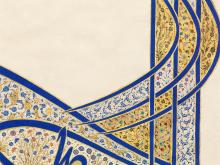On January 28 NELC and the Simpson Center for the Humanities will present a symposium featuring emerging literary scholarship working across and beyond the framework of national literature in order to examine the histories of literary modernity that took place under different names and yet drew on shared vocabulary across the Persianate world around the turn of the twentieth century. The past decade has witnessed the emergence of a growing conversation around the ‘Persianate world,’ an expanse of Eurasia defined by shared Persian aesthetic, literary, and moral forms (adab) which served as a field of connection and exchange from roughly the ninth to the nineteenth centuries. Some have conceived of the Persianate as a zone of connectivity tied to the cultural/literary capital of Persian language, while others have taken adab and a shared Persian literary canon to be the locus of the Persianate.
Bringing together scholars working across Persian, Arabic, Ottoman Turkish, Urdu, Armenian, and other languages, this symposium moves the conversation around the Persianate forward in time to address questions of literary modernity. How can the shared textual traditions of the Persianate offer an alternative model to the framework of comparison rooted in European national literatures? What happened to the interconnected, multilingual Persianate zone and its shared intellectual vocabulary in the wake of modern literature? How did the politics of disaffiliation and national distinction shape literary form and language ideology in the Persianate long nineteenth century?
Speakers include:
- Fatima Burney (English, University of California, Merced)
- Aria Fani (Persian and Iranian Studies, University of Washington)
- Alexander Jabbari (Persian Language & Literature, University of Oklahoma)
- Levi Thompson (Persian and Arabic, University of Texas, Austin)
- Sam Hodgkin (Comparative Literature, Yale University)
- Andrew Amstutz (Modern South Asian History, University of Arkansas at Little Rock)
- Maryam Fatima (Comparative Literature, University of Massachusetts, Amherst)
- Mehtap Özdemir (Postdoctoral fellow, Università di Bologna)
